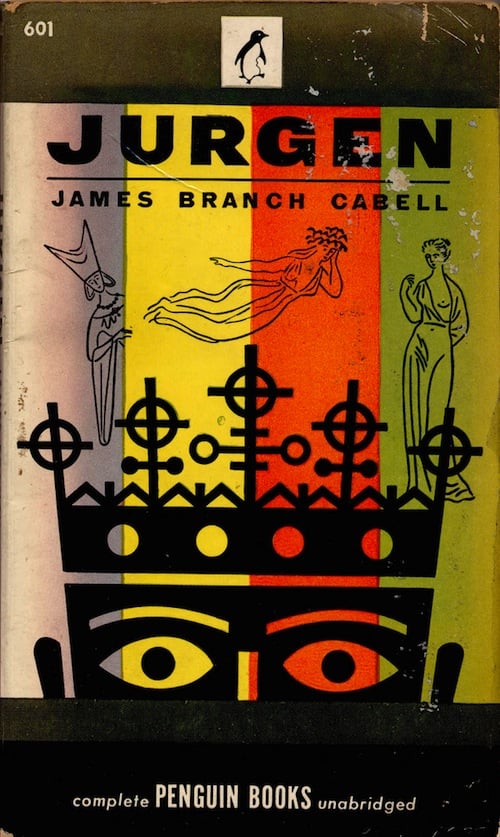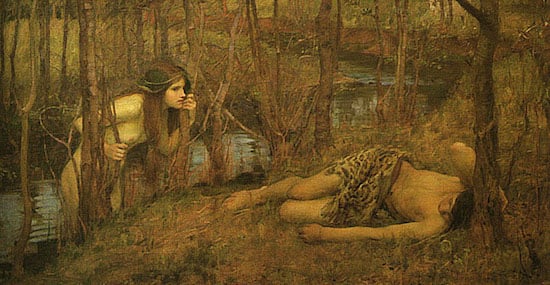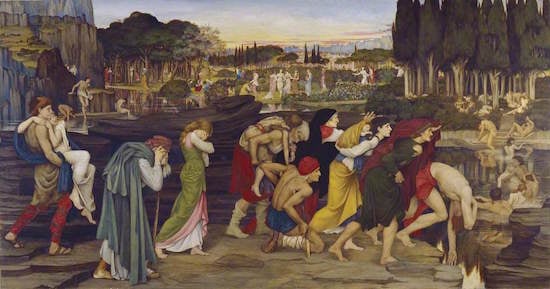Jurgen (34)
By:
November 6, 2015

James Branch Cabell’s 1919 ironic fantasy novel Jurgen, A Comedy of Justice, the protagonist of which seduces women everywhere he travels — including into Arthurian legend and Hell itself — is (according to Aleister Crowley) one of the “epoch-making masterpieces of philosophy.” Cabell’s sardonic inversion of romantic fantasy was postmodernist avant la lettre. HiLoBooks is pleased to serialize Jurgen here at HILOBROW. Enjoy!
Now the Philistines led out their prisoners, and made ready to inflict the doom which was decreed. And they permitted the young King of Eubonia to speak with Chloris.
“Farewell to you now, Jurgen!” says Chloris, weeping softly. “It is little I care what foolish words these priests of Philistia may utter against me. But the big-armed axemen are felling my tree yonder, to get them timber to make a bedstead for the Queen of Philistia: for that is what this Queen Dolores ordered them to do the first thing this morning.”
And Jurgen raised his hands. “You women!” he said. “What man would ever have thought of that?”
“So when my tree is felled I must depart into a sombre land wherein there is no laughter at all; and where the puzzled dead go wandering futilely through fields of scentless asphodel, and through tall sullen groves of myrtle, — the puzzled quiet dead, who may not even weep as I do now, but can only wonder what it is that they regret. And I too must taste of Lethê, and forget all I have loved.”
“You should give thanks to the imagination of your forefathers, my dear, that your doom is no worse. For I am going into a more barbaric limbo, into the Hell of a people who thought entirely too much about flames and pitchforks,” says Jurgen, ruefully. “I tell you it is the deuce and all, to come of morbid ancestry.” And he kissed Chloris, upon the brow. “My dear, dear girl,” he said, with a gulp, “as long as you remember me, do so with charity.”

“Jurgen” — and she clung close to him — “you were not ever unkind, not even for a moment. Jurgen, you have not ever spoken one harsh word to me or any other person, in all the while we were together. O Jurgen, whom I have loved as you could love nobody, it was not much those other women had left me to worship!”
“Indeed, it is a pity that you loved me, Chloris, for I was not worthy.” And for the instant Jurgen meant it.
“If any other person said that, Jurgen, I would be very angry. And even to hear you say it troubles me, because there was never a hamadryad between two hills that had a husband one-half so clever-foolish as he made light of time and chance, with his sleek black head cocked to one side, and his mischievous brown eyes a-twinkle.”
And Jurgen wondered that this should be the notion Chloris had of him, and that a gesture should be the things she remembered about him: and he was doubly assured that no woman bothers to understand the man she elects to love and cosset and slave for.
“O woman dear,” says Jurgen, “but I have loved you, and my heart is water now that you are taken from me: and to remember your ways and the joy I had in them will be a big and grinding sorrow in the long time to come. Oh, not with any heroic love have I loved you, nor with any madness and high dreams, nor with much talking either; but with a love befitting my condition, with a quiet and cordial love.”
“And must you be trying, while I die, to get your grieving for me into the right words?” she asks him, smiling very sadly. “No matter: you are Jurgen, and I have loved you. And I am glad that I shall know nothing about it when in the long time, to come you will be telling so many other women about what was said by Zorobasius and Ptolemopiter, and when you will be posturing and romancing for their delight. For presently I shall have tasted Lethê: and presently I shall have forgotten you, King Jurgen, and all the joy I had in you, and all the pride, and all the love I had for you, King Jurgen, who loved me as much as you were able.”
“Why, and will there be any love-making, do you think, in Hell?” he asks her, with a doleful smile.
“There will be love-making,” she replied, “wherever you go, King Jurgen. And there will be women to listen. And at the last there will be a bean-pole of a woman, in a wig.”
“I am sorry —” he said. “And yet I have loved you, Chloris.”

“That is my comfort now. And presently there will be Lethê. I put the greater faith in Lethê. And still, I cannot help but love you, Jurgen, in whom I have no faith at all.”
He said, again: “I am not worthy.”
They kissed. Then each of them was conveyed to an appropriate doom.
And tears were in the eyes of Jurgen, who was not used to weep: and he thought not at all of what was to befall him, but only of this and that small trivial thing which would have pleased his Chloris had Jurgen done it, and which for one reason or another Jurgen had left undone.
“I was not ever unkind to her, says she! ah, but I might have been so much kinder. And now I shall not ever see her any more, nor ever any more may I awaken delight and admiration in those bright tender eyes which saw no fault in me! Well, but it is a comfort surely that she does not know how I devoted the last night she was to live to teaching mathematics.”
And then Jurgen wondered how he would be despatched into the Hell of his fathers? And when the Philistines showed him in what manner they proposed to inflict their sentence he wondered at his own obtuseness.
“For I might have surmised this would be the way of it,” said Jurgen. “And yet as always there is a simplicity in the methods of the Philistines which is unimaginable by really clever fellows. And as always, too, these methods are unfair to us clever fellows. Well, I am willing to taste any drink once: but this is a very horrible device, none the less; and I wonder if I have the pluck to endure it?”
Then as he stood considering this matter, a man-at-arms came hurrying. He brought with him three great rolled parchments, with seals and ribbons and everything in order: and these were Jurgen’s pardon and Jurgen’s nomination as Poet Laureate of Philistia and Jurgen’s appointment as Mathematician Royal.
The man-at-arms brought also a letter from Queen Dolores, and this Jurgen read with a frown.
“Do you consider now what fun it would be to hood-wink everybody by pretending to conform to our laws!” said this letter, and it said nothing more: Dolores was really a wise woman. Yet there was a postscript. “For we could be so happy!” said the postscript.
And Jurgen looked toward the Woods, where men were sawing up a great oak-tree. And Jurgen gave a fine laugh, and with fine deliberateness he tore up the Queen’s letter into little strips. Then statelily he took the parchments, and found they were so tough he could not tear them. This was uncommonly awkward, for Jurgen’s ill-advised attempt to tear the parchments impaired the dignity of his magnanimous self-sacrifice: he even suspected one of the guards of smiling. So there was nothing for it but presently to give up that futile tugging and jerking, and to compromise by crumpling these parchments.
“This is my answer,” said Jurgen heroically, and with some admiration of himself, but still a little dashed by the uncalled-for toughness of the parchments.
Then Jurgen cried farewell to fallen Leukê; and scornfully he cried farewell to the Philistines and to their devices. Then he submitted to their devices. Thus, it was without making any special protest about it that Jurgen was relegated to limbo, and was despatched to the Hell of his fathers, two days before Christmas.
RADIUM AGE SCIENCE FICTION: “Radium Age” is HILOBROW’s name for the 1904–33 era, which saw the discovery of radioactivity, the revelation that matter itself is constantly in movement — a fitting metaphor for the first decades of the 20th century, during which old scientific, religious, political, and social certainties were shattered. This era also saw the publication of genre-shattering writing by Edgar Rice Burroughs, Sax Rohmer, E.E. “Doc” Smith, Jack London, Arthur Conan Doyle, Aldous Huxley, Olaf Stapledon, Karel Čapek, H.P. Lovecraft, Charlotte Perkins Gilman, Yevgeny Zamyatin, Philip Gordon Wylie, and other pioneers of post-Verne/Wells, pre-Golden Age “science fiction.” More info here.
READ GORGEOUS PAPERBACKS: HiLoBooks has reissued the following 10 obscure but amazing Radium Age science fiction novels in beautiful print editions: Jack London’s The Scarlet Plague, Rudyard Kipling’s With the Night Mail (and “As Easy as A.B.C.”), Arthur Conan Doyle’s The Poison Belt, H. Rider Haggard’s When the World Shook, Edward Shanks’ The People of the Ruins, William Hope Hodgson’s The Night Land, J.D. Beresford’s Goslings, E.V. Odle’s The Clockwork Man, Cicely Hamilton’s Theodore Savage, and Muriel Jaeger’s The Man with Six Senses. For more information, visit the HiLoBooks homepage.
SERIALIZED BY HILOBOOKS: Jack London’s The Scarlet Plague | Rudyard Kipling’s With the Night Mail (and “As Easy as A.B.C.”) | Arthur Conan Doyle’s The Poison Belt | H. Rider Haggard’s When the World Shook | Edward Shanks’ The People of the Ruins | William Hope Hodgson’s The Night Land | J.D. Beresford’s Goslings | E.V. Odle’s The Clockwork Man | Cicely Hamilton’s Theodore Savage | Muriel Jaeger’s The Man With Six Senses | Jack London’s “The Red One” | Philip Francis Nowlan’s Armageddon 2419 A.D. | Homer Eon Flint’s The Devolutionist | W.E.B. DuBois’s “The Comet” | Edgar Rice Burroughs’s The Moon Men | Charlotte Perkins Gilman’s Herland | Sax Rohmer’s “The Zayat Kiss” | Eimar O’Duffy’s King Goshawk and the Birds | Frances Hodgson Burnett’s The Lost Prince | Morley Roberts’s The Fugitives | Helen MacInnes’s The Unconquerable | Geoffrey Household’s Watcher in the Shadows | William Haggard’s The High Wire | Hammond Innes’s Air Bridge | James Branch Cabell’s Jurgen | John Buchan’s “No Man’s Land” | John Russell’s “The Fourth Man” | E.M. Forster’s “The Machine Stops” | John Buchan’s Huntingtower | Arthur Conan Doyle’s When the World Screamed | Victor Bridges’ A Rogue By Compulsion | Jack London’s The Iron Heel | H. De Vere Stacpoole’s The Man Who Lost Himself | P.G. Wodehouse’s Leave It to Psmith | Richard Connell’s “The Most Dangerous Game” | Houdini and Lovecraft’s “Imprisoned with the Pharaohs” | Arthur Conan Doyle’s “The Sussex Vampire.”
ORIGINAL FICTION: HILOBROW has serialized three novels: James Parker’s The Ballad of Cocky The Fox (“a proof-of-concept that serialization can work on the Internet” — The Atlantic); Karinne Keithley Syers’s Linda Linda Linda (which includes original music); and Robert Waldron’s roman à clef The School on the Fens. We also publish original stories and comics. These include: Matthew Battles’s stories “Gita Nova“, “Makes the Man,” “Imago,” “Camera Lucida,” “A Simple Message”, “Children of the Volcano”, “The Gnomon”, “Billable Memories”, “For Provisional Description of Superficial Features”, “The Dogs in the Trees”, “The Sovereignties of Invention”, and “Survivor: The Island of Dr. Moreau”; several of these later appeared in the collection The Sovereignties of Invention | Peggy Nelson’s “Mood Indigo“, “Top Kill Fail“, and “Mercerism” | Annalee Newitz’s “The Great Oxygen Race” | Flourish Klink’s Star Trek fanfic “Conference Comms” | Charlie Mitchell’s “A Fantasy Land” | Charlie Mitchell’s “Sentinels” | Joshua Glenn’s “The Lawless One”, and the mashup story “Zarathustra vs. Swamp Thing” | Adam McGovern and Paolo Leandri’s Idoru Jones comics | John Holbo’s “Sugarplum Squeampunk” | “Another Corporate Death” (1) and “Another Corporate Death” (2) by Mike Fleisch | Kathryn Kuitenbrouwer and Frank Fiorentino’s graphic novel “The Song of Otto” (excerpt) | John Holbo’s graphic novel On Beyond Zarathustra (excerpt) | “Manoj” and “Josh” by Vijay Balakrishnan | “Verge” by Chris Rossi, and his audio novel Low Priority Hero | EPIC WINS: THE ILIAD (1.408-415) by Flourish Klink | EPIC WINS: THE KALEVALA (3.1-278) by James Parker | EPIC WINS: THE ARGONAUTICA (2.815-834) by Joshua Glenn | EPIC WINS: THE MYTH OF THE ELK by Matthew Battles | TROUBLED SUPERHUMAN CONTEST: Charles Pappas, “The Law” | CATASTROPHE CONTEST: Timothy Raymond, “Hem and the Flood” | TELEPATHY CONTEST: Rachel Ellis Adams, “Fatima, Can You Hear Me?” | OIL SPILL CONTEST: A.E. Smith, “Sound Thinking | LITTLE NEMO CAPTION CONTEST: Joe Lyons, “Necronomicon” | SPOOKY-KOOKY CONTEST: Tucker Cummings, “Well Marbled” | INVENT-A-HERO CONTEST: TG Gibbon, “The Firefly” | FANFICTION CONTEST: Lyette Mercier’s “Sex and the Single Superhero”
